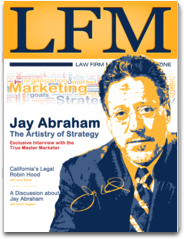
I recently discovered a very informative article called “iPad Apps for Lawyers” published by this group which pares down the somewhat exhaustive list of apps to about 50 that are really useful to trial lawyers. To review the entire list categorized by function, click here.
While visiting their site, I also learned a lot about their app called JuryPad.
What an amazing tool at a very reasonable price ($19.99 for the iTunes download). Watch the short promotional video for all the features and tools to assist not only with voir dire but mapping of jury pools, demographics, statistics and trial results.
Donna A. Jones
Senior Vice President

































 The keyword lists you generate during the research phase of your Web content strategy are only suggestions of what MAY work. To truly unearth the money-making keywords, you have to evaluate these keywords based on the following three points:
The keyword lists you generate during the research phase of your Web content strategy are only suggestions of what MAY work. To truly unearth the money-making keywords, you have to evaluate these keywords based on the following three points:

